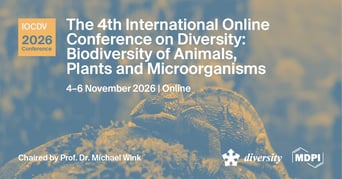- 4.1Impact Factor
- 7.6CiteScore
- 17 daysTime to First Decision
News & Conferences
Latest News & Announcements
Latest Conferences
Propose a Conference Collaboration
Promote and publicise your upcoming conference with MDPI.
All News & Conferences
News & Announcements
MDPI INSIGHTS: The CEO’s Letter #32 - MDPI China and Thailand, China Science Daily, 1,000 Partnerships, R2R
28 February 2026
News & Announcements
World Wildlife Day—“Medicinal and Aromatic Plants: Conserving Health, Heritage and Livelihoods”, 3 March 2026
28 February 2026
News & Announcements
MDPI Webinar | World Wildlife Day, 3 March 2026
25 February 2026
News & Announcements
MDPI Virtual Academic Publishing Workshop (New Harvest), 25 February 2026
20 February 2026
News & Announcements
MDPI’s Open Access Program Reaches 1,000 Institutions Worldwide
18 February 2026
News & Announcements
World Pulses Day—“Pulses of the World: From Modesty to Excellence”, 10 February 2026
11 February 2026
News & Announcements
Acknowledgment to the Reviewers of Plants in 2025
11 February 2026
News & Announcements
Plants Travel Award—Winners Announced
6 February 2026
News & Announcements
MDPI INSIGHTS: The CEO's Letter #31 - MDPI 30 Years, 500 Journals, UK Summit, Z-Forum Conference, APE
2 February 2026
MDPI Conference
The 4th International Online Conference on Diversity: Biodiversity of Animals, Plants and Microorganisms
4 - 6 November 2026
News & Announcements
Plants | Editor’s Choice Articles in 2025 (I)
28 January 2026
News & Announcements
Welcoming New Early Career Editorial Board Members of Plants
26 January 2026
of 27













